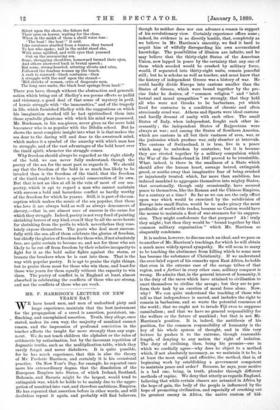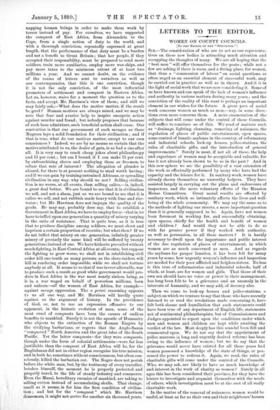MR. F. HARRISON'S LECTURE ON NEW YEAR'S DAY.
WE have heard men, and men of undoubted piety and large experience, maintain that the best instrument for the propagation of a creed is assertion, persistent, un- flinching, and unexplained assertion. Truth, they allege, once stated, makes its own way, the majority of mankind cannot reason, and the impression of profound conviction in the teacher affects the taught far more strongly than any argu- ment. We do not teach children the alphabet or the rules of arithmetic by ratiocination, but by the incessant repetition of dogmatic truths, such as the multiplication-table, which they rarely forget and never disbelieve. It is quite possible, for he has much experience, that this is also the theory of Mr. Frederic Harrison, and certainly it is his occasional practice. On New Year's Day, for example, he repeated once more his extraordinary dogma that the dissolution of the European Empires into States, of which Ireland, Scotland, Bohemia, and Bavaria might be the largest, would tend to extinguish war, which he holds to be mainly due to the aggre- gation of mankind into vast, and therefore ambitious, Empires. He has repeated that assertion before in other words, and will doubtless repeat it again, and probably will find believers, though he neither does nor can advance a reason in support of his revolutionary view. Certainly experience offers none ; indeed, its evidence is so directly hostile, that, completely as we believe in Mr. Harrison's sincerity, we find it hard to acquit him of wilfully disregarding his own accumulated knowledge. The possibilities of illusion are infinite, and he may believe that the thirty-eight States of the American Union, now lapped in peace by the certainty that any one of them which seceded would be crushed by military force, would, if separated into thirty-eight units, remain peaceful still; but he is scholar as well as teacher, and must know that the history of independent Greece was a history of war. He could hardly divide Europe into cantons smaller than the States of Greece, which were bound together by the pre- cise links he desires, of "common religion" and "intel- lectual and moral sympathies" so strongly, that they held all who were not Greeks to be barbarians, yet which lived for centuries in a condition of chronic and often atrociously cruel war. Athens and Sparta were ideal cantons and hardly dreamt of amity with each other. The small States of Italy, when independent, fought each other in- cessantly; the independent States of Rajpootana were always at war; and among the States of Southern America, which are cantons in all but their vastness of area, war, or the jealousies which produce war, only slumber at intervals. The cantons of Switzerland, it is true, live in a peace which may be unbroken by centuries ; but it is because they are riveted together by a military compulsion which the War of the Sonderbund in 1847 proved to be irresistible. What, indeed, is there in the smallness of a State which should alter the human heart, assuage hatred, extinguish greed, or soothe away that imaginative fear of being crushed or injuriously treated, which, far more than ambition, has induced mankind to aggregate themselves into mighty States, that occasionally, though only occasionally, have secured peace to themselves, like the Roman and the Chinese Empires, for a century at a time? So far as we can see, the only effect upon war which would be exercised by the subdivision of Europe into small States, would be to make piracy the most profitable of world-wide trades, because no Canton would have the means to maintain a fleet of war-steamers for its suppres- sion. They might confederate for that purpose ? Ah ! truly they might ; but then they would be "bound together by that common military organisation" which Mr. Harrison so eloquently condemns.
It is useless, however, to discuss such an ideal, and we pass on to another of Mr. Harrison's teachings, for which he will obtain a much more widely spread sympathy. He will seem to many to be teaching the abstinence from killing which to some men has become the substance of Christianity. If we understand the over-brief report of his remarks upon East Africa, he holds that even in the extreme case of the savage tribes of that region, and a fortiori in every other case, military conquest is wrong. He admits that, in the general interest of humanity, it is the duty of the races which have attained to civilisation to exert themselves to civilise the savage; but they are to per- form their task by an exertion of moral force alone. Now, why ? We can quite understand the teaching of those who tell us that independence is sacred, and includes the right to remain in barbarism, and so waste the potential resources of the world ; that we ought not to invade Fiji even to suppress cannibalism; and that we have no general responsibility for the welfare or the future of mankind ; but that is not Mr. Harrison's position. It is, indeed, the antithesis of his position, for the common responsibility of humanity is the key of his whole system of thought, and in this very lecture he pushes it to the extreme, though reasonable length, of denying to any nation the right of isolation. The duty of civilising, then, being his premiss—one in which we cordially agree—why does he object to a method which, if not absolutely necessary, as we maintain it to be, is at least the most rapid and effective, the method, that is, of beginning work by establishing a government competent to maintain peace and order? Because, he says, your motive is a bad one, being, in truth, plunder through different methods of rapine. We deny that utterly as regards England, believing that while certain classes are actuated in Africa by the hope of gain, the body of the people is influenced by the hope of promoting civilisation, and especially of crushing out its greatest enemy in Africa, the native custom of kid- napping human beings in order to make them work by terror instead of pay. For ourselves, we have supported the conquest of East Africa, from Alexandria to the Cape, from a single notion of duty to the world, and with a thorough conviction, repeatedly expressed at great length, that the performance of• that duty must be a burden and not a benefit to Great Britain ; that her people, if they accepted their responsibility, must be prepared to send more soldiers, train more auxiliaries, employ more war-ships, and pay more taxes to the minimum extent of at least two millions a year. And we cannot doubt, on the evidence of the reams of letters sent to ourselves as well as our contemporaries, that this is one conviction, though it is not the only conviction, of the most influential promoters of settlement and conquest in Eastern Africa. Let us, however, waive for a moment the question as to the facts, and accept Mr. Harrison's view of them; and still we may fairly ask,—What does the motive matter, if the result be good ? Human motives are always mixed, and we may be sure that fear and avarice help to inspire energetic action against murder and fraud ; but nobody proposes that because of such base admixture, such beneficial action shall cease. Our contention is that our government of such savages as these Negroes lays a solid foundation for their civilisation ; and if that is true, what do our motives matter, except to our own consciences ? Indeed, we are by no means so certain that the motive attributed to us, the desire of gain, is so bad a one after all. It is very easy to crack cheap jokes about philanthropy and 15 per cent. ; but am I bound, if I can make 15 per cent. by enfranchising slaves and employing them as freemen, to refuse that rate of interest ? The allegation of plunder is absurd, for there is at present nothing to steal worth having; and if we can gain by training untrained Africans, or spreading civilisation in any way, why should we not? Selling civilisa- tion is no worse, at all events, than selling calico.--is, indeed, a great deal better. We are bound to see that it is civilisation we sell, and not a sham, just as we are bound to see that it is calico we sell, and not rubbish made heavy with lime and rice- water; but Mr. Harrison does not impugn the quality of the goods. He may say, probably does say, that to establish a Government in East Africa, we have to employ force—that is, we have to inflict upon one generation a quantity of misery varying in the ratio of resistance. That is quite true, as it is true that to produce discipline among soldiers, we must shoot and imprison a certain proportion of recruits; but what then ? If we do not inflict that misery on one generation, infinitely greater misery of precisely the same kind will be suffered by twenty generations instead of one. We have hitherto prevailed without much fighting, in East Central Africa at all events; but suppose the fighting to grow worse, we shall not in establishing civil order kill one-tenth as many persons as the slave-raiders will kill in rendering order impossible, while we shall not torture anybody at all. It seems to us that if war is ever allowable, war to produce such a result as good white government would pro- duce in East Africa is the war most nearly sinless, being, as it is, a war waged on behalf of powerless millions, born and unborn—al/ the women of East Africa, for example— against savage oppression. The a priori reasoning appears to us all one way, and Mr. Harrison will hardly quote against us the argument of history. In the providence of God, or, not to use an expression offensive to our opponent, in the historic evolution of man, some of the most cruel of conquests have been the causes of endless benefits to mankind. Surely it is not the apostle of Humanity who objects to the extinction of the Roman Empire by the vivifying barbarians, or regrets that the A glo-Saxon " conquered " North America and the great isles of the South Pacific. Yet the latter conquests—for they were conquests, though under the form of colonial settlements—were far less justifiable than the conquest of East Africa will be, for the Englishman did not in either region recognise his true mission, and in both he, sometimes without consciousness, but often con- sciously, killed the barbarian out. The Negro does not perish before the white man, but, by the testimony of every traveller, betakes himself, the moment he is properly protected and properly taxed, to the life of steady industry and commerce. Even the Masai, hereditary enemies of mankind, are taking to selling cotton instead of accumulating skulls That change, small as it seems, is for him the first condition of civilisa- tion; and but for the " conquest " which Mr. Harrison denounces, it might not arrive for another six thousand years.















































 Previous page
Previous page